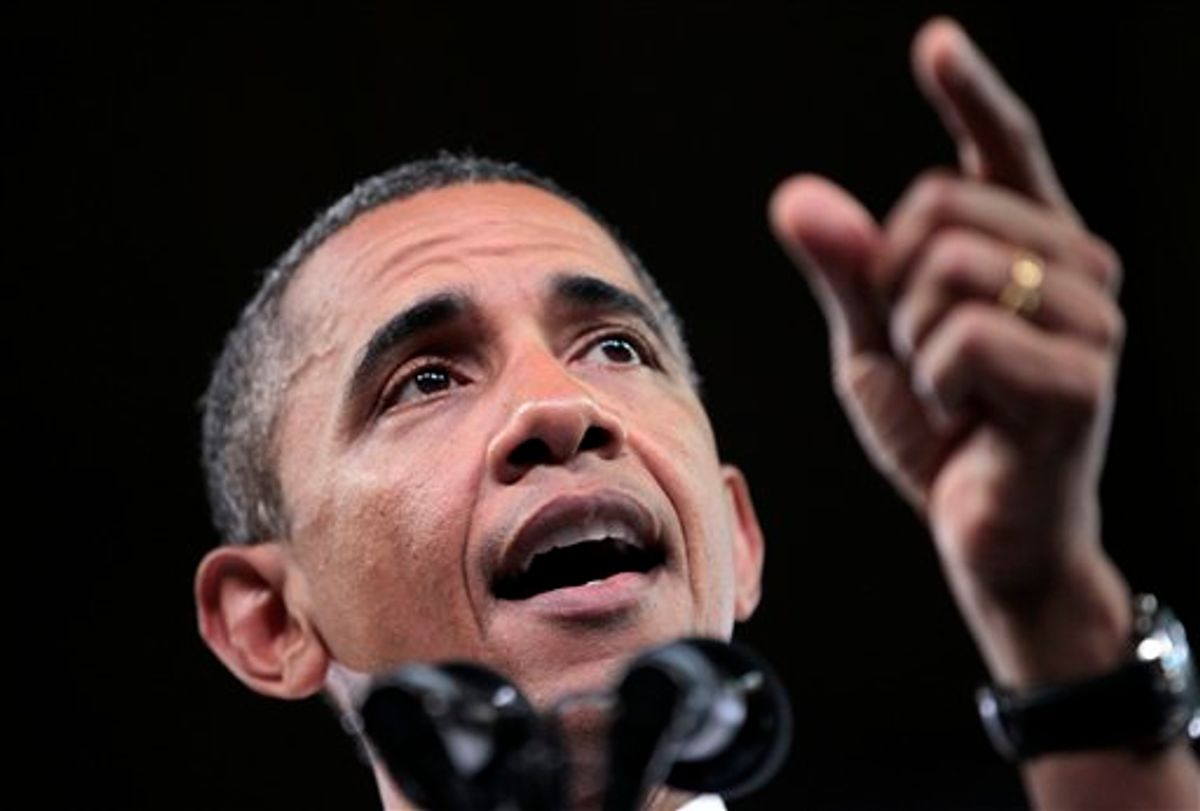The "Buffett principle" that President Obama will apparently embrace Monday morning is a lot like the jobs plan he unveiled earlier this month: The fact that it has little chance of being codified is practically beside the point.
According to reports that broke Sunday night, Obama will present the following line demand as the congressional deficit reduction supercommittee formulates its plan: If the final blueprint calls for Medicare and Social Security cuts without demanding more revenue from the wealthy, he’ll veto it. Apparently, Obama will unveil his own $3 trillion that will call for eliminating tax loopholes and deductions for the wealthy -- a group that Warren Buffett, one of the richest men in America, has been arguing benefits from an effective tax rate that is disproportionately low compared to middle class.
Of course, we already know the chances that a Republican-controlled is not about to rally around a concept like this, no matter how much it might cut into the deficit. "It’s a very simple equation," Speaker John Boehner said last week. "Tax increases kill jobs."
But Obama wants the fight anyway, another sign that the White House has woken up to two grim realities: (1) The economy is not recovering and may soon slip into another recession; and (2) There’s very little that Obama can now do about it, given the GOP’s strength on Capitol Hill and its resolve to oppose just about any policy he embraces -- even policies with Republican roots.
Politically, this suits Republicans just fine. The correlation between economic anxiety and the failure of presidents to win reelection is well-established -- hence Obama’s declining poll numbers and the trial heats that show Mitt Romney breathing down his neck and Rick Perry not far behind. So, since he can’t enact policies that will generate economic momentum in the next year, Obama’s only recourse is to do everything he possibly can to convince swing voters that their anxiety is mainly a product not of his own stewardship but of Republican obstructionism.
The jobs plan fits into this nicely. Obama introduced it with a splashy primetime speech and submitted his own bill to Congress and he has campaigned intently for it, insisting that Congress treat it as an urgent, take-it-or-leave-it proposition -- not a starting point for compromise and negotiation. This is smart political theater, a recognition that extraordinary efforts are required if swing voters are going to see this as anything but just another ordinary, soon-to-be-forgotten proposal. And it helps that the components of the plan are generally popular: a payroll tax cut and tax cuts for small businesses, aid to the states, and infrastructure investment.
That Republican leaders have so far refrained from launching a full-scale attack on the plan shows the uncomfortable spot Obama has put them in. The devastating economic news of the past few months has created a broad sense of urgency among voters for something, anything to be done. Clearly, the GOP -- which already suffers from a potentially serious image problem of its own -- saw a risk in offering a knee-jerk rejection of Obama’s plan. This doesn’t mean Obama will end up winning passage of his plan. Maybe Republicans will ultimately relent and consent to an extremely watered-down version, but that’s probably the best Obama can hope for from a policy standpoint. It’s almost beside the point, though. The goal here is to highlight Obama’s desire to do something with the GOP’s preference for doing … nothing.
The same thinking seems to be at work with the "Buffett principle." Republicans won’t even waste their time pretending to consider hiking taxes on the wealthy, and that’s just fine by the White House. Asking the rich to pay more is an idea that consistently polls well, and the more Obama can make the case that it’s a basic act of fairness in the face of serious entitlement cuts, the more attention the GOP’s opposition will receive.
So what we have here is the makings of a reelection strategy, one rooted in redirecting swing voters’ intense anxiety, frustration and anger away from Obama and onto the GOP. Obviously, there’s not much inspiring about this, but it’s probably Obama’s best bet for winning a second term -- and maybe then having more leverage to actually enact some of his preferred economic policies.
It’s also more challenging than it sounds. The voters who decide elections tend not to follow political news closely, and seem to work backward in forming their opinions -- deciding first whether they want to reelect an officeholder, then building a rationale. And that initial decision is usually guided by the state of the economy. When it’s strong, swing voters will come up with reasons to support the incumbent; when it isn’t they will embrace reasons not to -- even if it means backing a candidate with whom they disagree on most individual issues. We saw this at work in 2010, when voters latched onto the GOP as a protest vehicle, even though polls showed (and continue to show) that most Republican priorities weren’t that popular.
The jobs bill and the new veto threat both represent efforts to get swing voters to think twice before instinctively blaming Obama. Let’s see what else the White House tries in the weeks and months ahead.



Shares